“It doesn’t make sense, I know it doesn’t. Forty-five minutes later, I’m tied in knots. I’m angry and confused and all over the place. But the moment that he asked, in that second, that breath hanging in the air between him and me— There was a blossom of warmth. A burst of— I don’t know. Faith? Maybe it was the Spirit, maybe it was my imagination. But I felt it. That it—this—was the right thing. It was completely terrifying. And now I want to deny that it happened, but I can’t. I can’t.” — Abigail in ‘Pilot Program,’ by Melissa Leilani Larson
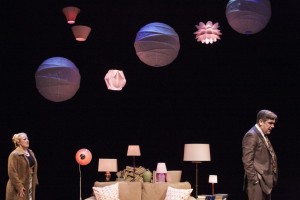
For a small performing arts company, Plan-B Theatre is carving out an enormously important niche as a presenter of original plays. When a new play touches upon the most provocative issues connected to Mormonism, the playwright consistently rejects the role of omniscient author. Rather, the playwright establishes a new context for healthy and genuine voices to emerge with a consciousness that responds sensitively to the unique environment of faith and spirituality in which we all reside, regardless of whether or not we are Mormons.
In ‘Pilot Program,’ the latest premiere serves as one of Plan-B’s most definitive examples of its artistic brand, from the words of playwright Melissa Leilani Larson to the exquisitely understated direction by Jerry Rapier and to the moments of silence and awkwardness impressively executed by the cast of three actors (Mark and April Fossen, and Susanna Florence Risser).
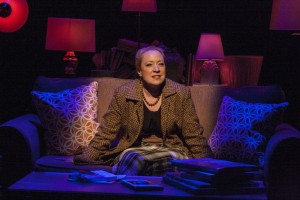
Set in 2019, ‘Pilot Program,’ revolves around a professional middle-aged Mormon couple with no children who have been called to participate in an LDS program restoring polygamy. However, Larson sets her sights on a vaster landscape in this living room drama that reveals the most insecure, humbling blocks in our paths of finding a self-actualizing state of consciousness in individual identity, faith and relationships.
The actors (Mark as Jacob and April, his wife in real life, as Abigail, and Risser as Heather, who enters the plural marriage) show just how much we resist encounters that should be genuine. Even the humor and the brief heady excitement about the new family arrangement are skillfully focused on the larger theme, underscoring just how clever and instinctive we have become in evading the humbling aspects of genuine encounters and relationships. Indeed, the story and setting here perfectly encapsulate the distance and skepticism we impose upon ourselves, which deliberately prevents us from realizing and enjoying the richness and the illuminating responsiveness of our connections to spirituality and faith.
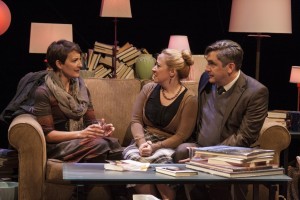
Jacob, the only male character in the play, is anything but loquacious and Mark Fossen’s performance is on point at every instance. His taciturn awkwardness inverts the stereotype we might otherwise envision in a theatrical treatment of polygamy and in a religion that is associated with a strong sense of patriarchy. Jacob is loving and gentle but is emotionally immature or, better yet, unprepared to deal with genuine encounters. Jacob’s most talkative moments come in his encounter with Heather, his new wife. With innocent charm, he shares his love of fast cars, and then he recalls getting a speeding ticket after Abigail had suffered her third miscarriage:
“Got caught going 106 once. This was years later. It was late on a Sunday night, and the freeway was practically empty. It was a $400 ticket. Yeah, that was not a good night. Abby had had her third miscarriage that day. She was the most despondent I’d ever seen her. No. She wasn’t even despondent. She was—still. Utterly quiet. She wouldn’t talk to me, and it was like—I couldn’t win her back from wherever she was. We came home from the hospital and she just went to bed. I couldn’t sleep. I was all nerves and raw anger.”
The revelation is left as is, and the dialogue between them quickly switches to road trip music and breezy anecdotes.
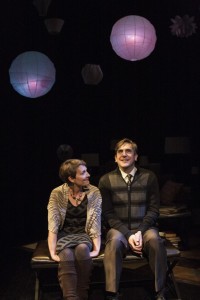
Along with the silence are the numerous examples of incompleteness. A former student of Abigail, Heather (played by Risser with impressive credibility) initially is taken aback by the couple’s request to join this experiment in plural marriage. While she dreamed of a fairy-tale wedding in her earlier years, she says now, “But finishing BYU single was liberating in a way. I didn’t need to get married to be whole. I was—I am me. I have a job. I support myself. I go to church on Sunday and I think how blessed I am to be in complete control of my life. To only have to worry about what I want. Sometimes, though, there is that little nagging feeling that something—someone is missing. I’ll come home late from work, and my apartment is dark and quiet. Most days, I relish the quiet.”
Later, the audience hears Abigail say the same line—this time to her husband. Marking the transition between scenes, Abigail (perhaps the most exceptional performance the always-solid April Fossen has given in a Plan-B production), a professor and writer, shares excerpts from her blog. One captures the brief honeymoon spring of the experiment:
“And that’s what we did. We made up the rules as we went. We three—dated. Heather returned to San Francisco on the red-eye Sunday night, but came out to see us every other weekend. Dinners, movies, musicals… . Oh, I hate musicals. Jake acted in them in school—he’s been Tony in West Side Story like three times—so he loves to go. One year for Christmas he gave me season tickets… and I think he was a little devastated that I didn’t shriek in delight. Heather, though, apparently knows all the words to ‘You’re a Good Man, Charlie Brown.’ Who knew? My husband and I were dating, and not necessarily each other. I don’t know which of us was the third wheel.”
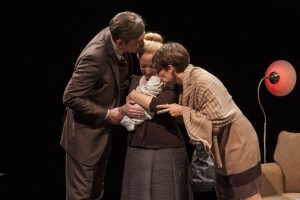
Yet, it is a short-lived exhilaration. Heather says the strangeness of the arrangement is wearing off, although she chooses her words cautiously to avoid saying with any conviction that the experience has become normal. The silences grow longer, especially between Abigail and Jacob.
Even in moments that might erupt in loud arguments are subdued, such as when Abigail offers to calm the baby. Heather says, “He’s not your son,” before quickly apologizing. Abigail says, “Nevermind.” Later, she tells Jacob she is content to be called the child’s aunt. At the end, the nature of the three characters’ relationship is unresolved and stuck in anthropocentric limbo.
Larson, a Mormon, wrote the play in response to a question about what it would take for her to leave the faith. And, in ‘Pilot Program,’ the cast and director have embodied most effectively the pertinent challenge raised by Larson. As for the same question being posed to the audience, each person must embark on his or her own project to fortify or rebuild an individual connection with one’s faith. And, in a faith governed by strict conventions of civility, the prospects of suggesting even cautiously anything different about the philosophical or theological underpinnings of Mormonism often strike its most gently abiding members as wild, alarming or inappropriately intellectualized.
Instead of looking for a cautious fallback position – that is, the wait-and-see attitude for the skeptical person – the search of the faithful begins by scrutinizing the long-standing gerrymandered sense of reality as the preliminary step toward reclaiming a genuine sense of spirituality that ultimately would strengthen one’s relationship with Mormonism. This epiphany in ‘Pilot Program’ comes through the silences and understatement with utmost clarity.
Five performances of ‘Pilot Program’ remain in the run which ends April 19. Tickets are going quickly. Performances will be Thursday, Friday at 8 p.m.; Saturday at 4 and 8 p.m., and Sunday at 2 p.m. in the Studio Theatre of the Rose Wagner Center for Performing Arts.
For ticket information, see here.


1 thought on “Plan-B Theatre’s ‘Pilot Program’ impressively executed statement of silence, understatement on faith, polygamy”